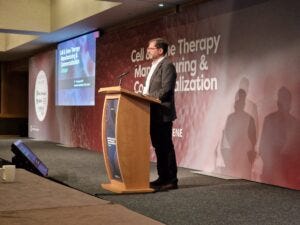
A US FDA investigation into the safety of CAR-T therapies is part of the growing pains in the cell and gene therapy sector, the head of the advocacy group assured conference attendees.
Speaking at the Cell & Gene Therapy Manufacturing & Commercialization Europe conference in Dublin, Ireland this morning, Miguel Forte, president-elect of the International Society for Cell & Gene Therapy (ISCT), said the cell and gene therapy (CGT) sector is blossoming.
One sign of this maturity is the emergence of real-world evidence as more products enter the market and more patients are treated. “The clinical benefit is still there, delivering opportunities for long-term benefits for patients,” he said, specifically in blood cancers, though industry is turning its attention to solid tumors.

Miguel Forte was speaking at at the Cell & Gene Therapy Manufacturing & Commercialization Europe conference in Dublin, Ireland
But with this comes the inevitably of concerns, Forte said, alluding to a recent investigation announced by the US Food and Drug Administration (FDA) into the post-treatment safety of CAR T-cell therapies.
The investigation is underway after the Agency received reports of T-cell malignancies – including chimeric antigen receptor CAR-positive lymphoma – in patients who received treatment with BCMA- or CD19-directed autologous CAR T cell immunotherapies. The FDA cited the risk of serious outcomes, including hospitalization and death, and is evaluating the need for regulatory action.
According to Forte, the 19 cases of CAR-T malignancies across a range of commercialized products is part of the sector’s maturity. “I have no concern on the safety event. I expect them, and I like discussing them. Putting them in the right picture is what we should do and is part of the maturity in the field.”
He linked the safety concerns with imagery of disinfecting a child’s knee after falling from a bicycle. “If it doesn’t sting it isn’t healing,” he said, adding industry’s job is to balance the risk with the benefit to bring a value proposition.
On a more positive regulatory note, Forte also highlighted action from regulators on both sides of the Atlantic, specifically in helping drive a platform approach for CGTs.
“The point is the more manufacturing we do, the more product we have [and] the more shared processes we will be having. The more opportunity for standardization, the more opportunity for not repeating the assessments, and not repeating what has been done before.”
About the Author
You May Also Like

schedl_b_and_w.jpg?width=100&auto=webp&quality=80&disable=upscale)
schedl_b_and_w.jpg?width=400&auto=webp&quality=80&disable=upscale)



